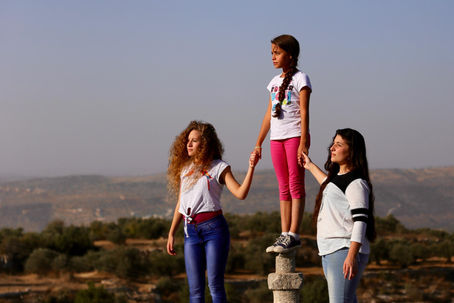Move to silence Palestine
- Cynthia Wang
- Jan 4, 2017
- 4 min read
A recent move from the Israeli government intending to limit the Islamic prayer calls in Palestine, starting from Jerusalem and later some other mixed-population cities such as Hebron, can be seen as a new ideological strategy to remove Palestinian identity.
Not long ago in November 2016, a shocking bill backed by the Israeli Prime Minister Benjamin Netanyahu, was approved by the Israeli Ministerial Committee for Legislation that will aim to ban the Muslim call for prayers in Jerusalem and Arab towns within the Green Line.
The draft law will then be moved to the Knesset. If passed, it will legitimize Israeli polices’ use of law enforcement and violent actions against Muslims’ call for prayer that caused people to “suffer from noise which is caused by the loudspeakers,” according to the Israeli PM.
These prayers, known as “azen” in Arabic, is a call for all Muslims to practice their religious rituals five times a day, broadcasted through loudspeakers by “Muadhin” from minarets of the mosques.
The discussion for this bill scheduled to happen in Knesset was postponed several times. However, later in December 2016, a new proposal was lifted to impose a stricter financial punishment up to ten thousand shekels to “places of worship in the event of the use of loudspeakers in the prohibited hours, according to the law.”
It soon has raised attention; fury spreads like wildfire throughout not only Palestine, but also a number of Muslim countries around the world.
Critics and scholars have said that this is a way, which the Israeli government adopted to “Judaize” the Holy City of Jerusalem as well as Palestine, apart from intending to insult Islam.
This is not the first time Israel has tried to interfere people of Palestine’s freedom of religion, though.
In fact, this try should not be merely taken as a restriction to religious freedom, but rather as Israel initiating an ideological war between religions, namely, Muslim v.s. non-Muslim, in order to achieve the ultimate goal of deleting the national identity of Palestine under the Israeli Zionist colonialism.
For centuries till present days, the struggle between the Arabs and Israeli Zionism and its effects on the Jewish community all around the world has resulted in the reinforcement of stereotyping the Orient, particularly in terms of dominant perception of Muslims and Islam.
Besides, they have turned out to be a more standardised mould in ideological language-usage forms is as well because of the history of popular anti-Arab and anti-Islamic prejudice in the West reflective of Orientalism. It is a collective notion that identifies “us”, the coloniser, against “those”, the colonised and explains the relationship between the Orient and the Occident with domination, power, and hegemony. What is worse is that in the post-9-11 era, the announcement of “War on Terror” gives rise to a racial-cultural discriminated discourse that directly links Muslims with support for terrorism, fundamentalism, and an “Oriental” stereotype of the East”.
Furthermore, the establishment of contemporary Palestinian national identity is multi-layered and influenced by a multiplicity of transnational, regional and local loyalties, in particular Arabism and Islam. However, researches indicate that the most significant element of the present-day Palestinian identity is the predicament and continuous violence they encounter with Israel; and their identity especially has been reinforced with regards to the resistant movements against Israel.
That is to say, this potential ban of prayer calls is not only a way of shifting the political and regional conflict into a more global-scaled religious and ideological strife but also an emphasis on the power Israeli colonialism and occupation on Palestinians.
“Banning the call for prayer is merely a reminder of Israel’s domination over the wounded Holy City, and a message that Israel’s control exceeds that of tangible existence, into every other sphere,” asserted Dr. Ramzy Baroud, author of ‘My Father Was a Freedom Fighter: Gaza’s Untold Story’.
The five-time a day prayer call has more than a religious meaning. It bears also a spiritual and symbolic significance. Many Palestinians have recalled and stated their experiences of relentless efforts to carry out their daily religious rituals during conflict times.
“In 2014, Ramadan came during the 50-day war with Israel. Against all odds, we fasted and practiced the daily prayers whenever we heard the call for prayers,” told a Gazan.
In Dr. Ramzy Baroud’s words, the calls for prayer, means continuity, survival, rebirth and hope. Most importantly, it becomes a way of resistance. It shows Palestinians’ determination of not being silenced even in the worst times.
According to many analysts, so far this amplified calls to prayer is still yet hard to implement completely and forcefully on the ground except some occasional clashes due to spreading defiance and the large number of Arab population who are as well Muslims living in the Palestinian territory or under Israeli occupation. The Palestinian Authority also has issued concerns and warnings regarding this bill to the Israeli government to prevent a potential more intensive conflict.
Nonetheless, it is important to recognize the fact that the Israeli government is aiming for something bigger, something that is beyond religion and nationality.
It is an ideological battle, which contributes to an ambition to silence the resistance, self-legitimate Israel’s occupational power and in the end becomes a mode of reasoning, or creating knowledge, that abstracts from lived individuals, namely, the Palestinians, engaged in everyday social interaction.
This article was published on the Malaysian media "New Strait Times".




Comments